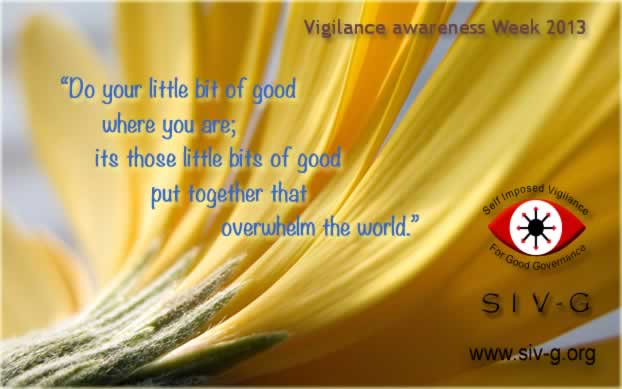It is not every day that an eleventh grader such as myself has the opportunity to read such thought provoking ideas as those exhibited by the participants of the Siv-G Online Essay Contest of 2011. The submitted essays, responding to the topics of human integrity and corruption, are a reality check to the current state of India. They not only efficiently point out the gravity of current problems, but also give possible solutions.
The awareness spread by Siv-G Essay Contest is a progressive step in the long, winding journey to end corruption. The ideas of the participants have drawn a schematic of the future well being of India. A reoccurring theme in the essays is the fact that in order to eliminate corruption “in public life, the private life has to be sanitized” (Sathyaprakash Rao). The only way to have the desired anti-corruption ripple effect on society is to purify the individual. This form of self improvement, or integrity, is solely based on the “consistency of actions, values [and] methods” in an individual’s life journey (S. Hindushree pg 1). The submitted essays establish motivating and rousing ways to improve both an individual’s “intellectual integrity” and “financial integrity” which, when lacking, can lead to the “weakening of the system, loss of people’s faith in administrative machinery, extravagant spending of public money … with misuse of power” in a society. (Vaishnavi pg 2). Benjamin Franklin, one of the greatest minds of the enlightenment, built his rags to riches story purely based off of individualistic improvement. In his autobiography, he establishes thirteen virtues based on reason and logic to build integrity in life. As a result he went from a mere newspaper printer to one of the founding fathers of the USA with accomplishments ranging from starting the first circulating library to becoming a US ambassador. Benjamin Franklin exhibited the difference one individual can make through simple everyday self improvement strategies. In conclusion, in order to build integrity and promote anti-corruption, each individual, in the words of Benjamin Franklin, must “resolve to perform what you ought; [and] perform without fail what you resolve” (Autobiography of Benjamin Franklin pg. 167).
There are endless ways to take self improvement and development of integrity and apply it to anti-corruption. The process is similar to building a pyramid in the sense that one must start at the bottom and lay a solid foundation for all the future anti-corruption work. It is important to keep in mind that age is not a limiting factor in the participation of any anti-corruption movement. All individuals have the freedom to voice their opinions where there is a need for reform. For example, in Britain’s Got Talent 2011, an internationally broadcasted event in which the winner performs in front of the Queen of England, 7 year old Olivia Binfield strutted onto the stage with a 9 foot Boa Constrictor around her neck and gave a speech to the judges on the importance of the conservation of endangered species. Her audition tape now has been seen by millions on YouTube making her an example where high individual integrity turned into action has made a difference. Furthermore, it is imperative for the younger generations not to be intimidated by overbearing societal conventions. Youth is not a synonym for naiveté and immaturity. The younger generation is more capable of looking at present problems with a fresh, unsullied mind, without which the anti-corruption movement is not possible.
A great way for all ages to incorporate the ideas presented in this competition is to start a Free Thinkers club. Club members can consist of friends from school, relatives, neighbors, etc. Dedicate an hour every week for a club meeting and simply talk about changes that can be done to help the community or even society in general, thus creating a non judgmental zone in which all individuals have the freedom to voice their thoughts. Then organize events for the betterment of the neighborhood. Possibilities can range from a monthly cleanup of the street to cooking food for a few homeless people on the side of the road. Even if such efforts make only a small dent in the whole sea of corruption do not get overwhelmed and stop. The essays submitted in this competition give incredible insight to the dismal state of corruption in India, however they all emphasize the fact that the development of personal integrity can lead to a less corrupted society. My recommendation for this generation is to observe corruption and confront it. The resulting change may be small but it is still a progressive step in the anti-corruption movement. In the famous words of Mother Teresa, “If you can't feed a hundred people, then feed just one. We ourselves feel that what we are doing is just a drop in the ocean. But the ocean would be less because of that missing drop.”

